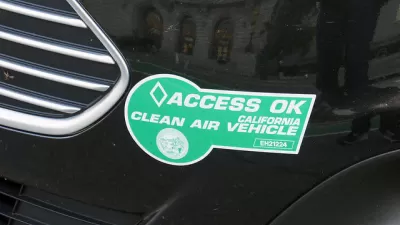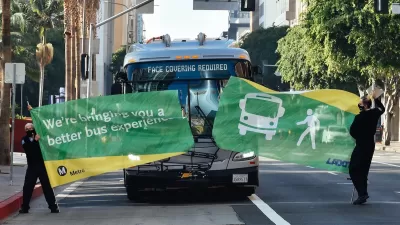The 110 High Occupancy Toll Lanes, conversions of carpool lanes, appear to be a victim of their own success, writes LA Times transportation reporter Laura J. Nelson. An economist would say the solution is to raise the maximum per-mile toll. Or is it?
"So many drivers now steer into the Harbor Freeway's northbound toll lanes to escape morning traffic jams that the paid route is slowing down too," writes Los Angeles Times transportation reporter Laura Nelson. "Over the course of a year, even as the per-mile toll crept toward the maximum, traffic in the paid lanes increased by almost 20% and speeds began to slow."
Metro's algorithm modifies the per-mile toll as frequently as every five minutes, based on how many cars are using the lanes. Tolls range from 25 cents to $1.40 a mile, for a maximum one-way price of $15.40 along the 11-mile route.
Would raising the $1.40 maximum per-mile toll alleviate the problem? Nelson makes a strong case that the toll schedule is irrelevant during peak hours.
But drivers who don't pay tolls from their own wallets have made it more difficult for Metro to influence demand through prices, said Kathleen McCune, Metro's congestion reduction director. Contractors, lawyers and consultants who bill clients for the toll will pay the price, no matter how high. "It could go up to $2,000 a mile and it wouldn't matter to them," she said.
The experts at Brookings take a different perspective.
"The fact that the speeds are getting low suggests prices aren't high enough," said Clifford Winston, a Brookings Institute economist who focuses on transportation policy. "There's no such thing as a price ceiling. If tolls went up to $10 per mile, I'm sure it would have an effect."
This correspondent sides with Brookings. While the toll lanes opened in November 2012, the toll schedule was determined three years earlier, as our July 2009 post indicates. How many transit systems haven't raised their fares six years?
Rather than just looking at the problem of oversubscription of the toll lanes, it's important to put the current situation into perspective. Two years ago Nelson wrote of just the opposite problem (posted here): undersubscription.
Hat tip to Len Conly of Sierra Club Chapter Transportation Chairs listserv.
FULL STORY: MTA's toll-lane project may be a victim of its own success

Maui's Vacation Rental Debate Turns Ugly
Verbal attacks, misinformation campaigns and fistfights plague a high-stakes debate to convert thousands of vacation rentals into long-term housing.

Planetizen Federal Action Tracker
A weekly monitor of how Trump’s orders and actions are impacting planners and planning in America.

Chicago’s Ghost Rails
Just beneath the surface of the modern city lie the remnants of its expansive early 20th-century streetcar system.

Bend, Oregon Zoning Reforms Prioritize Small-Scale Housing
The city altered its zoning code to allow multi-family housing and eliminated parking mandates citywide.

Amtrak Cutting Jobs, Funding to High-Speed Rail
The agency plans to cut 10 percent of its workforce and has confirmed it will not fund new high-speed rail projects.

LA Denies Basic Services to Unhoused Residents
The city has repeatedly failed to respond to requests for trash pickup at encampment sites, and eliminated a program that provided mobile showers and toilets.
Urban Design for Planners 1: Software Tools
This six-course series explores essential urban design concepts using open source software and equips planners with the tools they need to participate fully in the urban design process.
Planning for Universal Design
Learn the tools for implementing Universal Design in planning regulations.
planning NEXT
Appalachian Highlands Housing Partners
Mpact (founded as Rail~Volution)
City of Camden Redevelopment Agency
City of Astoria
City of Portland
City of Laramie




























